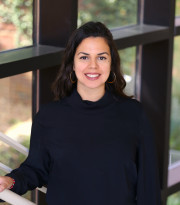New Member Spotlight: Lara Perez-Felkner Tackles Inequality in STEM Education
“In order to best support STEM students, and especially, to help underserved students thrive in these programs and open the door for high-paying careers, university leaders should take deliberate steps forward to adjust the course requirements and supports that are in place.” -Lara Perez-Felkner, Florida State University
For this new member spotlight, SSN is excited to highlight Professor Lara Perez-Felkner and her research on the ways higher education institutions can better support women, those from low-income families, and minority students in attaining Science, Technology, Engineering, and Mathematics (STEM) degrees.
Perez-Felkner’s policy brief on the topic, Transforming Opportunity to Support STEM Success for All, came out of her work with the Student Experience Research Network’s Midcareer Fellows Program. The Student Experience Research Network, or SERN, works to advance the research, relationships, and capacity necessary to build an education system in which every student experiences respect as a valued person and thinker.
In the program, midcareer fellows broaden their understandings of policymaking and how research is used in the policy process, concluding in the development of their own research-based policy brief. The program partnered with the Scholars Strategy Network to host a series of trainings focused on these topics.
“The SERN team, my peers and invited mentors in the group, and the SSN trainings we had on policy impacts have been wonderfully helpful for the work to date and the work that lies ahead beyond the fellowship,” said Perez-Felkner of her time in the program.
Perez-Felkner’s policy brief centers on the experiences of women and students across genders who are from underserved and underrepresented communities in the STEM fields. She explains how these students’ experiences can be compared to, “walking up a series of escalators going the wrong direction,” due to unreasonable expectations and financial barriers.
Perez-Felker explained to SSN: “I have interviewed dozens of talented and ambitious Florida students enrolled in our public colleges and universities. These students are making practical, creative, and difficult decisions to make ends meet and pursue their goals. We can help more students be successful on this path if we reconsider and adjust unnecessary and often compounding hurdles they encounter in secondary and postsecondary school challenges. This research brief builds on my own and others’ research into these topics, to suggest approaches to enhance broader participation and success in these fields.”
Perez-Felkner closes her brief with a set of recommendations which she writes could create, “real change… for those who need it most.” Her recommendations include:
- More coordination between K-12 and state/university policymakers to align secondary and postsecondary course preparation in science and mathematics, for students from all backgrounds and schools.
- Lower the entry point for postsecondary majors in high-demand, high-earning technical fields.
- Reconsider grade penalties for STEM majors.
As she writes, “Science and mathematics degrees can help students step on to a rising escalator. But these programs too often come with unreasonable expectations and financial barriers that make them unattainable. That is why, today, senior scientists and technology leaders do not reflect America. To change this, we have a compelling interest in fixing the broken escalators, to make pathways to opportunity rise, in the right direction.”
Perez-Felkner is in the process of publishing additional research papers related to these lines of study and is working to publicly disseminate her findings. She is also part of additional research practice partnerships and centers around STEM, educational equity, and their intersections.

Lara Perez-Felkner is an Associate Professor of Higher Education and Sociology at Florida State University and fellow at the Student Experience Research Network. Her research uses developmental and sociological perspectives to examine how social contexts influence youths' college and career outcomes. She investigates racial-ethnic, gender, and socioeconomic disparities in post-secondary educational attainment and entry to scientific career fields.